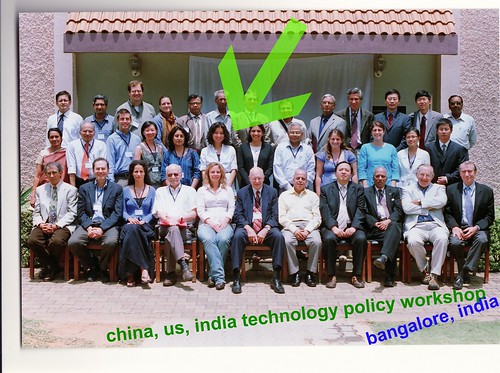Joined the US delegation to the China-India-US Workshop on Science, Technology and Innovation Policy Workshop

I was so excited to be a member of the United States delegation to the China-India-US Workshop on Science, Technology and Innovation Policy Workshop. This NSF-funded program is part of George Mason University’s Science and Trade Policy Program and the conference this year was held at the National Institute of Advanced Studies (NIAS) in Bangalore, India. I sat on the Information Technology panel and learned a lot about the other two topics, coal and pharmaceuticals!
We visited Biocon and InfoSys. I also met several nuclear policy and technology experts who taught me a lot about Indo-US nuclear policy. I have to admit that I was much more into the human interaction than sitting through each presentation. But what I learned in the hallways from the other delegates was worth all the time spent in panels. Here's a video below from the first day:
Here are some photos and details about the workshop:

Much has been written about India and China as ‘emerging’ or, better,‘re-emerging’ powers on the world scene, and it is often stated that science and technology are essential keys to their re-emergence. The United States provides a model of a successful national innovation system which both countries have studied and selectively emulated. The China-India-US Workshop on Science, Technology and Innovation Policy was organized at the campus of the National Institute of Advanced Studies in Bangalore, from 7-9 July 2008, as a first step towards structuring an inquiry and, hopefully, catalyzing subsequent in-depth workshops and bi- or tri-national research partnerships. The event was supported by IUSSTF with additional support from the Chinese Academy of Sciences (CAS). 6 Chinese, 24 Indians, and 15 Americans participated in the workshop.
The workshop consisted of three sessions, each devoted to a particular science and technology sector with the objective of illuminating the broad theme of the workshop by means of specific case studies on Power Generation by Coal, Information Technology, and Pharmaceuticals. During each of these sessions, a Chinese, an Indian, and a U.S. participant gave short, summary presentations on these topics. The presenters in the session on power generation from coal have begun a discussion on the possibility of a subsequent, in-depth workshop in 2009-10 which would have the objective of initiating specific collaborative trilateral research projects on clean coal technologies.